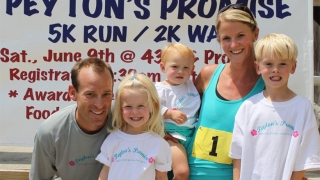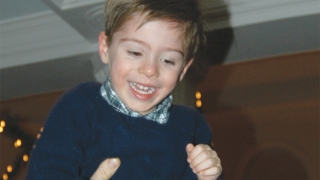About the Pulmonary Hypoplasia Program
The Pulmonary Hypoplasia Program (PHP) at The Children's Hospital of Philadelphia, established in 2004, is a comprehensive program for the treatment of children with pulmonary hypoplasia that makes it easier for children to receive complete care for this condition.
Our multidisciplinary team provides long-term follow-up and care for babies with conditions that cause small lungs and related pulmonary hypoplasia. Some healthcare professionals are unfamiliar with the options available to families that face this condition. It is our goal that all providers and families be aware of the pulmonary hypoplasia treatment options and services available for patients with this condition.
Watch this short video to learn more about the comprehensive treatment provided by the PHP.
Conditions we treat
Children who have been diagnosed with a condition that limits the ability of his or her lungs to fully develop, most commonly a congenital diaphragmatic hernia, lung lesion or giant omphalocele, may also develop a secondary condition called pulmonary hypoplasia. Pulmonary hypoplasia is characterized by small, underdeveloped lungs and may result in problems with:
- Breathing
- Feeding
- Cardiac function
- Hearing
- Meeting developmental milestones
If your child was treated for underdeveloped lungs in the Newborn/Infant Intensive Care Unit (N/IICU) at CHOP, our scheduler will contact you to set up your first appointment with the Pulmonary Hypoplasia Program. If your child was not a CHOP patient, or if you have questions about our PHP program, please call us at 215-590-2733.
Specialized care for your child
Ongoing developmental assessment from a multidisciplinary team is a standard of care provided to all children in the Pulmonary Hypoplasia Program at CHOP. No other institution provides this extra level of attention and concern when caring for children with pulmonary hypoplasia.
The PHP team collaborates with families to improve your child’s pulmonary health, evaluate neurodevelopmental growth, monitor and treat any surgical issues that arise as your child grows, meet nutritional needs, monitor for late onset hearing loss, help locate resources and support services near your home, and more.
Every visit to the Pulmonary Hypoplasia Program will be tailored to include all the specialists and testing your child might need. We make every effort to have everything in one day, in one location. The services and care provided during your child’s visit may include:
- Neonatology/Behavioral health: A developmental pediatrician, pediatric nurse practitioner and developmental psychologist will evaluate your child at specified intervals to optimize your child’s physical, developmental and educational needs.
- Pulmonary medicine: A pediatric pulmonologist will work with you to make the most of your child's pulmonary (lung) health. As needed, the team will perform pulmonary function testing to provide the most complete evaluation. In some cases, supplemental vaccinations may be recommended.
- Cardiology: A pediatric cardiologist will perform a full cardiac history and assessment. Any necessary testing, such as blood work, echocardiogram, or EKG, is completed during your visit.
- General surgery: As follow-up after your child's surgery, an evaluation by a pediatric surgeon and an advanced practice nurse allows us to respond to any post-surgical issues that may arise as your child grows and develops.
- Nutrition: A dedicated clinical dietitian will provide specialized counseling to develop individual plans to meet your child’s nutritional needs, either through tube feedings, oral feedings or a combination of both, to attain optimal growth and development.
- Audiology: Formal hearing tests will be performed through school age due to the risk of late-onset hearing loss.
- Social services: A social worker is available to work with you to address financial matters, school issues or other concerns. Social work can also help you locate community resources and support services to help you provide the best possible care for your child.
- Other services: In some instances, other evaluations, such as genetics, orthopedics, gastroenterology or ophthalmology, may be recommended.
Our structure allows clinicians to communicate and work together easily, so we can provide the most comprehensive care for your child and you can leave with a clear picture of your child's condition and a plan for ongoing support.
Any additional visits with specific specialists and testing are arranged on an individual basis.
Improving care through research
CHOP's Pulmonary Hypoplasia Program currently follows more than 885 children through our research efforts, 638 of which are actively receiving follow-up care in our clinical program (as of Feb. 5, 2020). We are the only institution studying the neurodevelopmental outcomes of these patients. Our goal is to improve understanding of pulmonary hypoplasia so that we can continuously improve care. Learn more about our research.


